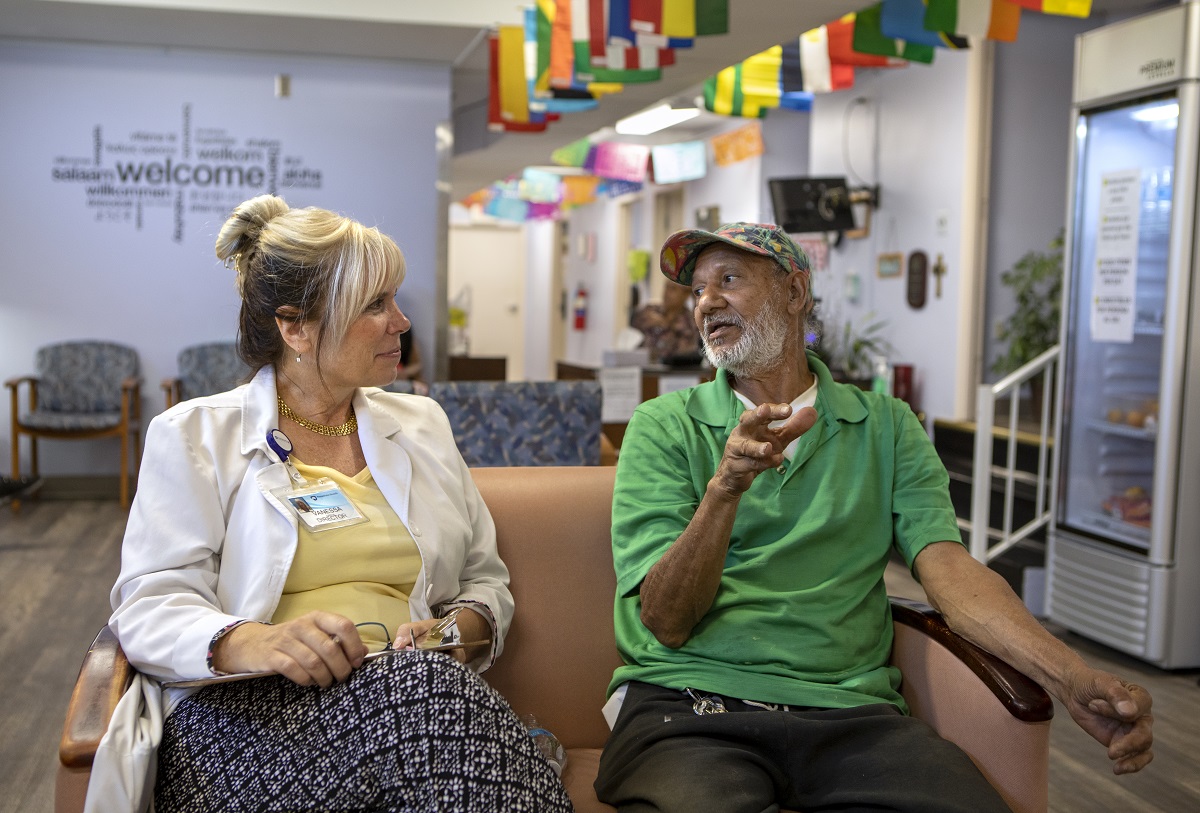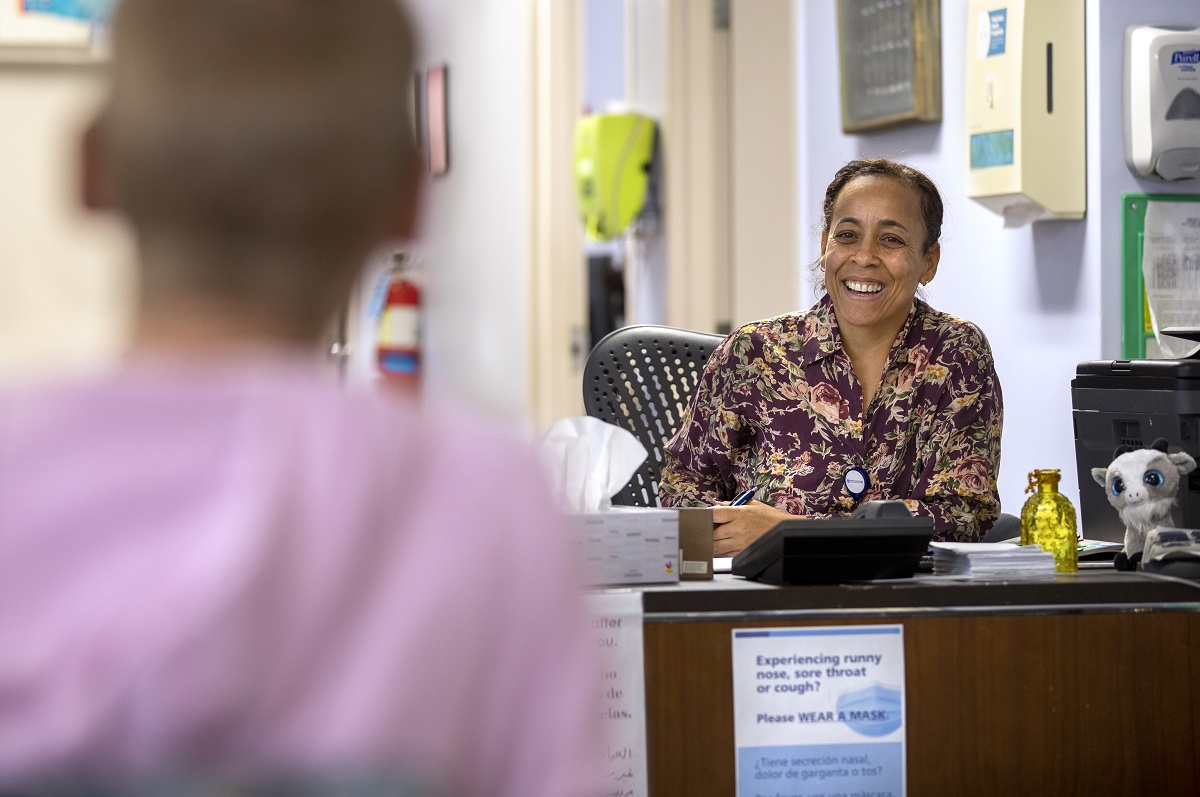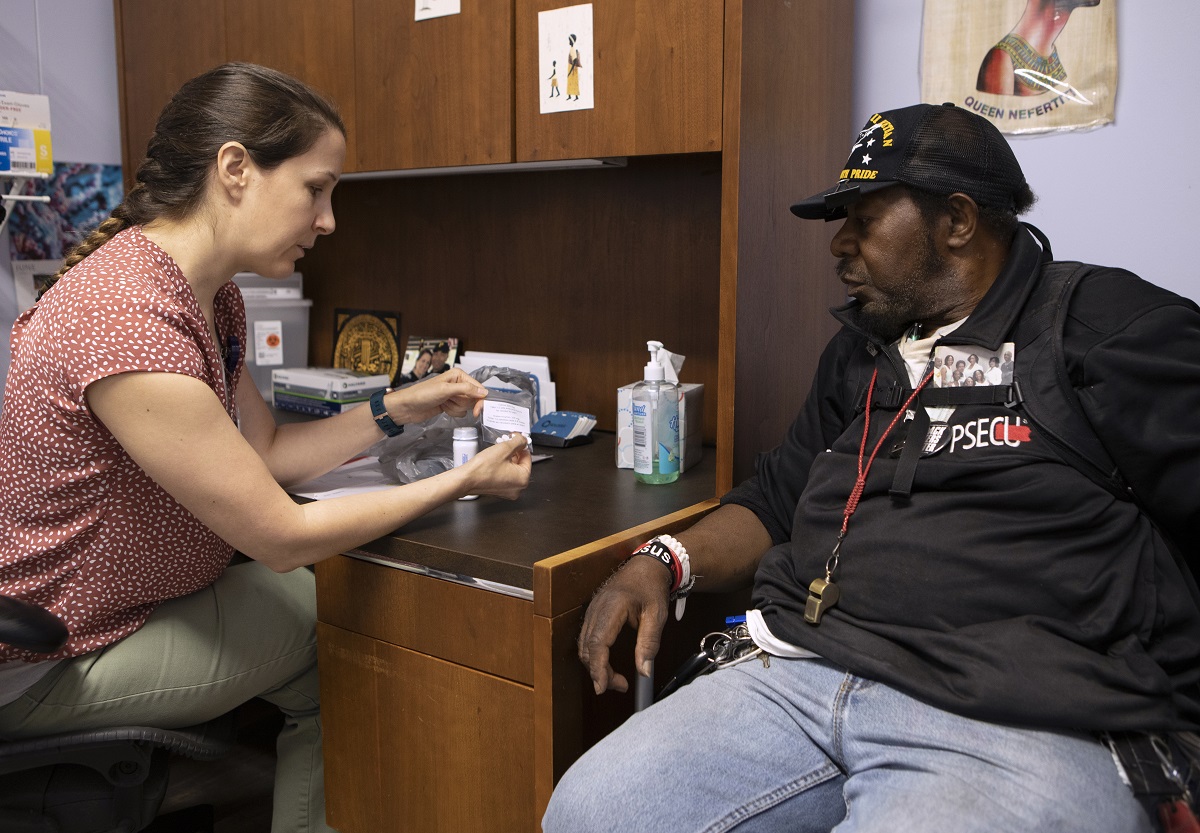Allison Hill’s secret gem: Clinic provides care, hope for residents

Vanessa Garcia found the young woman waiting by the door one morning when she arrived to open the Penn State Health Medical Outreach Service clinic in Harrisburg’s Allison Hill neighborhood.
The woman said she had a stomach ache. That wasn’t unusual. For two decades, the free clinic in the basement of Christ Lutheran Church on the heights overlooking Pennsylvania’s state Capitol has helped soothe thousands of stomach aches. Using donated ointments, bandages and antiseptics piled on shelves under the sanctuary, nurses and volunteers at the clinic treat cuts, bruises, headaches, cold sores and gas pains practically every day.
But when Garcia started checking, the woman’s stomach pains didn’t seem so simple.
“Have you taken a pregnancy test?” Garcia asked.
No, the woman told her. She’d had tubal ligation surgery, so she thought a baby was out of the question.
Garcia tested her. The woman was pregnant. It was almost definitely ectopic – a fertilized egg had implanted itself inside one of her fallopian tubes. Without medical help from a doctor, the tube would likely rupture, risking her life.
But like some patients at the clinic, the woman wasn’t living in the U.S. legally. Not only was getting help from a hospital expensive, some patients worried about exposure and deportation. “I didn’t want her to sit in the ER,” Garcia said. “I wanted her to be routed to the appropriate people.”
A community health worker arrived early that afternoon and, working alongside the clinic’s team, the woman received the help she needed.
It was a great day for Garcia and the staff, but like every one of its successes and tragedies during the past 20 years, the clinic marked it quietly. Don’t look for billboards advertising the Medical Outreach Service. You can find the entrance by looking down at the sidewalk in front of the church and following footsteps painted in yellow to a door to the basement. Patients from the tenements that lean over the crumbling walkways of Allison Hill hear of the clinic from friends and neighbors. Are you hurt? Do you need help? Do you have no where else to turn? At Medical Outreach Service, there are no steep bills, no threats of deportation and no judgmental stares. There’s access to first aid, help when you’re ill, screening for high blood pressure, and shoulders to cry on when tears are all you have left.
“Sometimes people just need to come in and sit and cry,” Garcia said.
A 2021 survey of six counties in central Pennsylvania showed more than half of people without health insurance can’t afford coverage. Even among those with policies, one in 11 still do not seek out health care because of the cost. In that same region, 42% of respondents had high blood pressure. Sixteen percent had diabetes, but among Latinos, the number climbs to 22%.
Allison Hill is among the areas that has the highest number of socioeconomic barriers to health care, according to the survey.
“As a steadfast advocate for health equity, our organization commits to addressing health disparities in the community,” said Ashley Visco, community health director at Penn State Health. “At the heart of this mission, the Holy Spirit outreach clinic plays a pivotal role in bringing health care access via a nurse led clinic that provides quality, compassionate and culturally competent care to a marginalized community.”
For two decades, the clinic – part of the Medical Outreach program affiliated with Penn State Health Holy Spirit Medical Center – has been an important thread in the fabric of the Allison Hill neighborhood. Garcia has been there for 19 years ― so long that newbies often call and ask, “Is this the Vanessa Clinic?”
Quietly and without fanfare, she and her staff work on the vanguard of social issues like drug addiction, street violence and immigration. They provide care, help fill out job and college applications, help find apartments and provide people living in the direst of circumstances what they need the most – hope.
Understanding
When you step into the waiting room through the basement door, hanging from the ceiling are the flags of the nations from which many of the foreign-born patients have come to the U.S. – Mexico, Egypt, Cuba and dozens of others.
You’re greeted by the smile of Anabel Gutierrez, a medical office associate who works the front desk. She’s had the job for a year, and she’s speaking Spanish again, which was one of the languages of her childhood.

Anabel Gutierrez, receptionist at the Medical Outreach Service, talks with Jessica Rathfon before her walk-in appointment.
Gutierrez was born in Cuba, but she’s lived in the U.S. for decades. Eventually, as she became educated and found a job and a better life, Spanish fell out of her speech.
The language is returning. At the same time, she’s relearning what it’s like to be one of the people she serves. When she was a teenager, Gutierrez and her family fled Cuba to Peru. They lived as refugees ― in poverty and always looking over their shoulders for a pursuer that would send them back.
Medical Outreach Service has revived those memories. In Peru, she’d sought help in a clinic much like this one, pausing to peer into rooms to decide whether they were safe to enter. She feared paperwork. She feared officials.
She remembers the despair. “Feeling like you want to ask for something ― you need help ― but you’re ashamed,” she said. Pity in the eyes of those who want to help, she says, deepens the shame.
So, in the waiting area, she has an understanding smile for everyone. “You’re careful not to change your face,” she says. “Because it’s scary. I know what it’s like.”
Since COVID-19, the waiting room doesn’t draw a big crowd. Before the pandemic, the rows of chairs under the flags were always filled. The room served as an unofficial community center of sorts. Dozens of people came to visit and socialize, whether they needed medical care or not, filling the room with conversation. Neighbors came in to use the phone. Others wanted a free bottle of water ― limit two per person ― coffee or a snack from the refrigerator.
Now the crowds are slowly beginning to return. Advice at the clinic ranges from specialized – cholesterol and blood pressure screenings are given regularly – to home remedies. The shelves are well stocked with over-the-counter medications, cough suppressants and even extra clothing. The clinic also pulls funds from a budget provided by the church to help people obtain life-sustaining medicines like insulin.
Needs run the gamut. Juan Romero Martinez came in for help with his medication. One morning several years ago, Martinez awoke in his apartment and felt ill. He called his sister in New York City and found he could barely speak. She drove three hours to Harrisburg to take him to a hospital, where doctors discovered he’d suffered a stroke.
The speech problems have lingered. Also, his memory has become faulty. He lives alone, and speaking mostly Spanish coupled with the dysphasia makes navigating the city that’s been his home for decades like stumbling through a fog.
Every week for the past four years, registered nurse Liz Kenion helps him schedule his medication, places pills into the correct slots in a container marked with the days.
Kenion also calls local organizations that help with elder care to try to get him assistance. She calls doctors’ offices to make appointments for him and tries to arrange rides.
“He looks pretty independent,” she said. “But he isn’t. It’s frustrating to get him resources because he seems like he can take care of himself. So that’s why he falls through the cracks a lot.”
The clinic reached 10,981 people in 2022. Patients seem to hail from every part of the globe – Africa to the Middle East to South America to clients born and raised just down the street.
Generations of care
More than 25 years ago, the clinic started in a soup kitchen created by the church on Allison Hill – long enough to see entire families form and spread.
Among its first clientele was Magdi Moussa, who three years earlier had moved to Allison Hill from Egypt. A Christian with a Coptic cross tattooed on his wrist, Moussa had come to the U.S. seeking asylum. At the time, he had practically nothing and couldn’t speak the language.
At the soup kitchen, he had a cough. Someone suggested he see the nurse they’d brought in.
Today, at age 57, Moussa is a regular fixture at the clinic. He has an appealing laugh that never stops, even as he talks about the hard times he knows too well. In Egypt, he’d been a lawyer. Today he drives a cab. “The glass is always half full,” he says.
Soon after he moved to the U.S., his sister and brother-in-law, Naser Kamel, and the Kamel’s four children followed him. Their troubles began almost immediately – their landlord threatened to evict the young family from their apartment over a dispute about a water bill.
Moussa directed them to the clinic, and the staff helped the family find a new place to live. They hired Kamel’s wife and helped teach her English. Meanwhile, Moussa’s wife was expecting, and nurses at the clinic helped her obtain free care at the church’s prenatal clinic. His wife had two children at Holy Spirit Medical Center.
For a generation, the families have come to rely on the clinic for much more than help when they were ill. They received assistance with seemingly small tasks with important reverberations. Before their English improved, staff members helped them sort their mail – this is a bill you must pay; this is junk mail to throw away. And when it came time for members of the family to go out into the world, the team at the clinic helped with college applications and resumes.
Today, Kamel’s oldest daughter is a doctor living in California. A son is a managing director at a car dealership. Another son just obtained a degree in international business, and his third son just started his own business in Harrisburg.
“We came here with nothing. We didn’t know anything,” Kamel said. Without the clinic, what would the past two decades have been like? he wonders. Perhaps they would have made their own way. Perhaps their lives would have taken a darker turn.
The family meets others like themselves all the time – newcomers at a crossroads between fresh chances or dead ends. When people come to him with difficulties finding health care, problems with paperwork or insurance issues, Kamel always says the same thing: “Welcome to America!”
Then he tells the story many on Allison Hill already know ― how his brother-in-law visited a church for a bowl of soup and left with a new life.
Helping families overcome disparities in health care is part of the Penn State Health strategy to improve wellness and disease prevention. Learn more in the Penn State Health Community Health Needs Assessment and Implementation Plan.
If you're having trouble accessing this content, or would like it in another format, please email Penn State Health Marketing & Communications.

